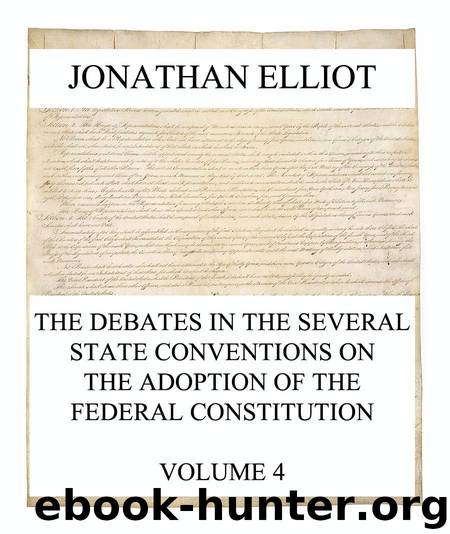The Debates in the several State Conventions on the Adoption of the Federal Constitution, Vol. 4 by Jonathan Elliot

Author:Jonathan Elliot [Elliot, Jonathan]
Language: eng
Format: epub
Tags: Politikwissenschaft
Publisher: Jazzybee Verlag
Published: 2019-05-27T22:00:00+00:00
The system, it cannot be denied, is in many parts obscure. If Congress are to explain and declare what it shall be, they certainly will have it in their power to make it what they please. It has been a strong objection to the Constitution, that it was remarkably obscure; nay, some have gone so far as to assert that it was studiously obscure — that it might be applied to every purpose by Congress. By this very act, the house are assuming a power to alter the Constitution. The people of America can never be safe, if Congress have a right to exercise the power of giving constructions to the Constitution different from the original instrument. Such a power would render the most important clause in the Constitution nugatory; and one without which, I will be bold to say, this system of government never would have been ratified. If the people were to find that Congress meant to alter it in this way, they would revolt at the idea: it would be repugnant to the principles of the revolution, and to the feelings of every freeman in the United States.
It is said that the power to advise the President in appointing officers is an exception to a general rule. To what general rule? That the President, being an executive officer, has the right of appointing. From whence is this general rule drawn? Not from the Constitution, nor from custom, because the state governments are generally against it. Before the gentleman had reasoned from this general rule, he ought to have demonstrated that it was one. He ought to have shown that the President, ex officio, had the power to appoint and remove from office; that it was necessarily vested in the executive branch of the government.
It is said to be the duty of the President to see the laws faithfully executed, and he could not discharge this trust without the power of removal. I ask the gentleman if the power of suspension, which we are willing to give, is not sufficient for that purpose? In case the Senate should not be sitting, the officer could be suspended; and at their next session the causes which require his removal might be inquired into.
It is said to be incumbent on us to keep the departments distinct. I agree to this; but, then, I ask, what department is the Senate of, when it exercises its power of appointment or removal? If legislative, it shows that the power of appointment is not an executive power; but if it exercises the power as an executive branch of government, there is no mixing of the departments; and therefore the gentleman’s objections fall to the ground.
The dangers which lie against investing this power jointly in the Senate and President, have been pointed out; but I think them more than counterbalanced by the dangers arising from investing it in the President alone. It was said that the community would take part with the injured officer against the President, and prevent his reëlection.
Download
This site does not store any files on its server. We only index and link to content provided by other sites. Please contact the content providers to delete copyright contents if any and email us, we'll remove relevant links or contents immediately.
The Secret History by Donna Tartt(19002)
The Social Justice Warrior Handbook by Lisa De Pasquale(12177)
Thirteen Reasons Why by Jay Asher(8874)
This Is How You Lose Her by Junot Diaz(6857)
Weapons of Math Destruction by Cathy O'Neil(6249)
Zero to One by Peter Thiel(5767)
Beartown by Fredrik Backman(5718)
The Myth of the Strong Leader by Archie Brown(5482)
The Fire Next Time by James Baldwin(5409)
How Democracies Die by Steven Levitsky & Daniel Ziblatt(5200)
Promise Me, Dad by Joe Biden(5132)
Stone's Rules by Roger Stone(5065)
A Higher Loyalty: Truth, Lies, and Leadership by James Comey(4937)
100 Deadly Skills by Clint Emerson(4900)
Rise and Kill First by Ronen Bergman(4761)
Secrecy World by Jake Bernstein(4727)
The David Icke Guide to the Global Conspiracy (and how to end it) by David Icke(4685)
The Farm by Tom Rob Smith(4489)
The Doomsday Machine by Daniel Ellsberg(4474)
